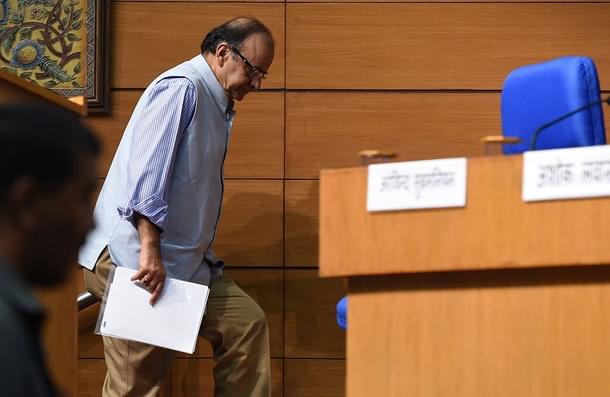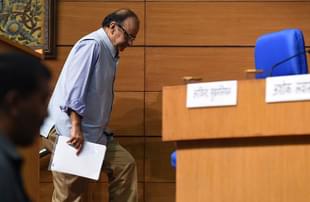Economy
In Run-Up To GST, India May Need Two FMs; Afterwards, Two Mini-FMs Will Do
R Jagannathan
Aug 19, 2016, 01:43 PM | Updated 01:42 PM IST
Save & read from anywhere!
Bookmark stories for easy access on any device or the Swarajya app.


With GST, India may need two Finance Ministers, and later only one. With the goods and services tax (GST) now destined to become a reality, the Finance Minister’s job will initially double and then halve.
In the run-up to the actual implementation of GST, which is scheduled for 1 April 2017 (but could be delayed to mid-year if deadlines are not met), the most important job of Arun Jaitley is the GST itself. He also has the regular budget to handle, since it involves tweaking things to ensure that there is enough money to compensate states in case of a revenue shortfall in the initial years.
The process of implementation of GST is a long and arduous one. This is why India needs a full-time GST Minister apart from Jaitley. The GST Minister’s job will be to push and prod states to get the constitutional amendment done, and after that get their state GST acts passed. The real work then begins; he has to get 29 states to agree on rates for literally hundreds of product and service categories. Since the idea is that there will be three basic rates and an exempt category, all products and services will have to be force-fitted into the zero, standard rate (possibly 18-20 percent rate), and two other rates, one above and one below the standard rate for luxury and essential goods, respectively.
In the short run, Jaitley and Narendra Modi thus have the thankless job of trying to get states to agree first on the standard rate, and then on where to place each product in the rate bands available.
This task is not going to be easy as there are 29 states and two Union territories to reckon with, and each one will have a different idea about which products or services are important for it from a revenue-generating potential.
The key change with the arrival of GST is that both centre and states will now have to jointly determine the rates for indirect taxes. This will necessarily be an open process, and thus the current secrecy surrounding the making of budgets will have to be abandoned.
Since it may take upto three years for centre-state tussles over rates and bands to settle down, it is difficult to see how Jaitley can do this all on his own. Modi would do well to appoint a smart, young, tech-savvy minister as GST Minister under Jaitley with another line of reporting to the PMO.
This is why one effectively needs two Finance Ministers in the short run; GST, being the biggest national revenue churner, will need 24x7 attention. Every indirect tax, from customs to excise to service tax and a multitude of state and city taxes will be subsumed in GST.
However, once the GST law is implemented and becomes self-enforcing, neither centre nor states will be able to do more than tinker with it every year. The GST Council may occasionally change the rates or rate bands or shift items from one band to the other, but this will be a long process, and one is unlikely to see dramatic changes year after year after the initial settling-in period. Getting consensus on every item means there will be few changes once the basic are set.
In effect, the Centre-State GST Council will become the new Indirect Taxes Ministry, and the Union Finance Minister will find that he has only to focus on direct taxes – income-tax and corporation tax. These taxes are already stable, and don’t require year-to-year tinkering. This is when the Finance Minister’s job will become easier. As Dhirendra Swarup, a former Expenditure Secretary, told the Times of India, “Part two of the budget where you have the tax rates will be reduced by more than 50 percent and you will only have direct tax rates.” Another former finance ministry official, CM Vasudeva, is quoted as saying: “The relevance of the budget will not go but the degree of secrecy may come down as the recommendations of the (GST) council on rates will be in the public domain.”
We may then need only half a
finance minister. Most likely, we may need two half finance ministers, one to
mind direct taxes, and the other to sit in the GST Council and coax states to
do the right thing on indirect taxes. Arun Jaitley may well be the last Big FM in India’s history.
Jagannathan is former Editorial Director, Swarajya. He tweets at @TheJaggi.





